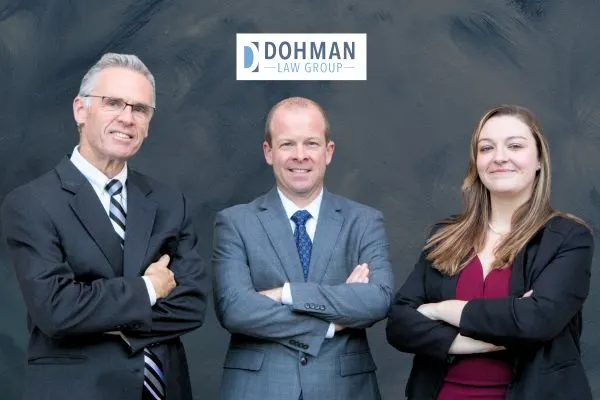- How Illinois Law Defines Aggravated Speeding
- Criminal Penalties for Aggravated Speeding
- Supervision, Denial of Supervision, and Long-Term Impact
- How Aggravated Speeding Affects Your License and Insurance
- Can You Be Arrested for Aggravated Speeding?
- Is Aggravated Speeding the Same as Reckless Driving or DUI?
- Why You Should Talk to a Traffic Attorney
- Contact Dohman Law Group About an Aggravated Speeding Charge
Many drivers think of speeding as a minor inconvenience, something closer to a parking ticket that doesn’t require an experienced traffic lawyer. Under Illinois law, that isn’t always the case. When your speed is high enough over the posted speed limit, you may be charged with aggravated speeding, a misdemeanor offense that carries real criminal consequences, including jail time, heavy fines, and a permanent criminal record.
Understanding how aggravated speeding in Illinois works, what penalties you face, and how the courts treat these traffic offenses is essential if you want to protect your driving record, your license, and your future.
How Illinois Law Defines Aggravated Speeding
Illinois has specific aggravated speeding laws that separate ordinary speeding violations from excessive speeding. Under the statute that governs speed restrictions, aggravated speeding generally means:
- 26–34 miles per hour over the maximum speed limit – charged as a Class B Misdemeanor.
- 35 miles per hour or more over the legal speed limit – charged as a Class A Misdemeanor.
By contrast, driving 1–25 miles per hour over the limit is usually a petty speeding offense, often treated as a fine-only petty offense. That lower-level offense is still a transgression under Illinois traffic laws, but it is not the same as a criminal misdemeanor conviction.
The rules apply on city streets, highways, and rural interstates. For example, if the prescribed speed limit is 70 mph on an hour on an interstate segment and a motorist is clocked at 96 mph, that is 26 miles per hour over the limit on roadways and may qualify as an aggravated speeding offense.
These definitions come from the Illinois Vehicle Code, located in Chapter 625, where the clause, subsection, and provisions of the paragraph governing speed control set out the statute for aggravated speed. While this article doesn’t replace legal advice, it does explain how those aggravated speeding laws work in practice.

Petty Speeding vs. Aggravated Speeding
The difference between petty speeding and criminal speeding is not just the number of miles per hour over the limit; it is also the impact on your life.
- A petty speeding offense (1–25 mph over) is usually handled with a speeding ticket, possible traffic safety classes or traffic school, and a fine plus fees and costs.
- An aggravated speeding offense (26+ mph over) is a criminal offense. The defendant faces a possible sentence that includes months in jail, probation, community service, and a permanent criminal conviction.
That is why punishments for speeding revolve around speed ranges and circumstances. What may look like one continuous driving act can fall into very different legal categories under Illinois law.
Criminal Penalties for Aggravated Speeding
An aggravated speeding citation exposes an offender to serious criminal penalties, even if they have never been arrested before.
Class B Misdemeanor – 26–34 mph Over
If a motorist is accused of driving 26–34 mph over the posted speed limit, they can be charged with a Class B Misdemeanor. Potential punishments include:
- Up to 6 months in jail (180 days)
- Fines of up to $1,500, plus mandatory court costs and other fees
- Possible supervision, community service, and traffic safety school
Class A Misdemeanor – 35+ mph Over
If the alleged speed is 35 mph or more over the limit, the charge is a Class A Misdemeanor. This is the most serious level of misdemeanor under Illinois traffic laws. Penalties can include:
- Up to 12 months in jail
- Fines up to $2,500, plus costs and mandatory court costs
- Supervision or probation with additional requirements, such as traffic safety classes, community service, or counseling
Because aggravated speeding is a criminal offense, the sentence can also include traffic safety school, community service through agencies like a social services department, and even sheriff’s work programs. The judge’s opinion about the circumstances, for example, whether there was an accident, a child in the vehicle, or a sick kid being driven to a hospital, can affect sentencing.

Supervision, Denial of Supervision, and Long-Term Impact
In many misdemeanor speeding cases, court supervision is a favorable option. Supervision can help a person avoid a formal criminal conviction while complying with conditions set by the courts, such as traffic school or community service.
However, Illinois law includes specific provisions that restrict supervision:
- Some school zone and construction zone cases involve denial of supervision.
- A subsequent offense of aggravated speeding may make an individual ineligible for supervision.
- In certain aggravated speeding Illinois cases, the judge may refuse supervision if the circumstances show reckless driving or disregard for traffic safety.
Even when supervision is granted, an aggravated speeding offense can have serious effects on insurance, employment, and professional licensing. A criminal record with a misdemeanor conviction, even for a first-time offender, can show up on background checks when applying for a job in major cities such as Chicago or anywhere in Cook County and beyond.
How Aggravated Speeding Affects Your License and Insurance
Each aggravated speeding ticket is a strike against your license. The Illinois Secretary of State can treat convictions for criminal speeding as significant violations for driving privileges.
Consequences may include:
- Accumulation of points on your driving record
- License suspension or longer monitoring periods if you have multiple traffic offenses
- Effects on insurance, such as premium hikes or loss of coverage
- Long-term impact on your ability to drive for work
For younger drivers or those who already have prior convictions, the risk to privileges can be even greater. Over time, repeated minor offenses and aggravated charges can add up to severe administrative punishments.
Learn More: How Long Do Points Stay on Your License in Illinois?
Can You Be Arrested for Aggravated Speeding?
When a law enforcement officer or police officer stops a vehicle and alleges that the driver was traveling 26 or more over the limit, an arrest is legally possible. In practice, many police officers issue an aggravated speeding citation and allow the motorist to leave after posting bond, often by signing the ticket or surrendering a license as security.
In some cases, especially where speeds are extremely high, reckless driving is suspected, or there has been an accident, the individual may be taken to the police station. From there:
- Bond conditions are set
- A first district circuit court date is issued
- The process of criminal proceedings begins
Even when no one was hurt and the defendant was simply late, on a highway in rural interstates, or hurrying with the idea of getting a sick kid home, the courts will treat an aggravated speeding offense with respect as a serious safety concern.
Is Aggravated Speeding the Same as Reckless Driving or DUI?
Aggravated speeding is not the same crime as DUI or reckless driving, but all three are serious criminal speeding-type charges:
- Aggravated speeding focuses on how many miles per hour over the speed limit the driver was going.
- Reckless driving involves driving with willful or wanton disregard for safety and can be charged when speeds are extremely high or circumstances show clear danger.
- DUI (driving under the influence of alcohol may be charged where there is evidence of impairment, regardless of speed.
At times and under certain circumstances, a single incident may involve more than one charge, such as both aggravated speeding and reckless driving. These combined criminal penalties raise the stakes considerably.
Learn More: First Time DUI Charges in Illinois
Why You Should Talk to a Traffic Attorney
Because an aggravated speeding Illinois case carries the possibility of jail, a lasting criminal record, and a serious impact on your career, it should never be handled like an ordinary parking or speeding ticket.
Experienced traffic attorneys can:
- Review the statute and local ordinance that apply to your case
- Analyze radar, pacing, or other finding methods used by law enforcement officers
- Evaluate options to reduce a misdemeanor to a fine-only petty offense, where allowed
- Seek supervision instead of a criminal conviction when the law and circumstances permit
- Advise on whether a plea is in your best interest or whether to contest the offense
A qualified lawyer can also explain how the chapter and subsection of the Illinois Vehicle Code apply to your case, what additional requirements the judge may impose, and what option best protects your license, your job, and your future.

Contact Dohman Law Group About an Aggravated Speeding Charge
The traffic attorneys at Dohman Law Group have extensive experience handling aggravated speeding Illinois cases in Cook County, Chicago, and the surrounding areas. They understand how a single aggravated speeding offense can affect an individual’s driving record, privileges, and career.
If you or a loved one has received an aggravated speeding ticket, do not assume it is just another minor offense. Speak with a knowledgeable lawyer who knows the process, the statute, and the local courts.
Call Dohman Law Group today at (847) 616-9993 for a confidential consultation. Getting experienced legal help now can make the difference between a one-time mistake and a criminal conviction that follows you for years.


